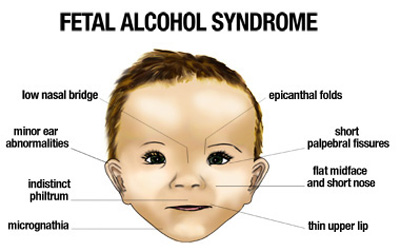New Guideline: Diagnosis of Fetal Alcohol Spectrum Disorder
By: Marcia Frellick
A new Canadian guideline for diagnosing fetal alcohol spectrum disorder (FASD) updates recommendations last issued in 2005 and is specifically designed for multidisciplinary diagnostic teams.
The guideline, published online December 14 in the Canadian Medical Association Journal, includes a change in terminology. Previously, the cluster of birth defects (including restricted growth, craniofacial abnormalities, and intellectual disabilities) caused by prenatal exposure to alcohol was known as fetal alcohol syndrome (FAS). The new terminology includes a wider spectrum of disabilities and presentations.
Estimates put the number of people with FASD at 1 in 100, translating to more than 330,000 people in Canada who are affected.
Primary Care Role Critical
Primary care physicians play a crucial role in diagnosing FASD, Christine A. Loock, MD, a developmental pediatrician at Children’s and Women’s Health Centre of British Columbia, Vancouver, Canada, said in an accompanying podcast conducted by the journal.
“The primary health provider is the medical home,” she said. “The trust and relationship that is key to that medical home is the foundation for making a referral.”
Dr Loock added, “alcohol does not just affect the brain but can affect other aspects, including fetal growth and other birth defects. Most important, there may be interventions that may mitigate alcohol’s effects, including nutritional interventions.”
She said primary care physicians should ask all women about alcohol use. “We should not confine this to times of pregnancy or postpartum, but to be asking young women and providing support…. Interventions do work.”
The Canada Fetal Alcohol Spectrum Disorder Research Network led the effort to update the guidelines with funding from the Public Health Agency of Canada.
New in This Version
The updated guidelines include special considerations for diagnosing FASD in infants, young children, and adults.
They recommend that infants and young children with all three sentinel facial features and small head circumference be diagnosed with “FASD with sentinel facial features.” These children are at high risk for neurodevelopmental disorder.
The three facial features are palpebral fissure length of at least two standard deviations below the mean (below the third percentile), philtrum rated 4 or 5 on the 5-point scale of the University of Washington Lip–Philtrum Guide, and thin upper lip rated 4 or 5 on that scale.
Growth is no longer a diagnostic criterion.
One of the study’s coauthors, Valerie Temple, PhD, from Surrey Place Centre in Toronto, Ontario, Canada, said during the podcast, “Growth deficits are not as common as we initially believed, and they are clearly not specific to FASD.”
The authors include a detailed flow chart in the new guidelines for help in making a diagnosis.
Infants and young children who do not meet the criteria for FASD, but have confirmed prenatal alcohol exposure, should be designated as, “At risk for neurodevelopmental disorder and FASD, associated with prenatal alcohol exposure,” the new guidelines advise.
The guidelines also stress the need for a multidisciplinary support team.
“Just as diagnosing FASD is important, so too is ensuring the patient and their caregivers receive the support they need to obtain necessary services that may improve quality of life,” lead author Jocelynn Cook, PhD, director of the Society of Obstetricians and Gynaecologists of Canada, said in a news release. “They will need specialized support from a team of experts such as child development specialists, occupational therapists, speech-language therapists, psychologists and specialized physician supports, depending on their ages.”
This project was funded by the Public Health Agency of Canada and the Canada Fetal Alcohol Spectrum Disorder Research Network. The authors have disclosed no relevant financial relationships.
CMAJ. Published online December 14, 2015.
Click HERE for Full text

